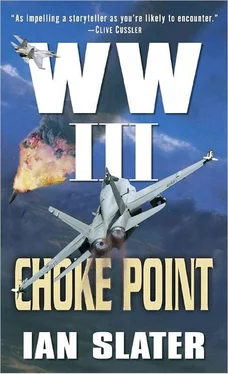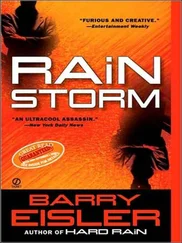Hall turned to Albinski’s winch man. “Bring him up!” Dixon’s umbilical looked all right.
The fact that Albinski didn’t answer Hall’s radio call wasn’t necessarily conclusive, because Hall knew that Albinski was a pro and might be breathing in air from his Bail bottle, the small, one-hour auxiliary tank that working divers strapped to their back. But without the insulation of air that kept Albinski warm earlier in the dry suit, there was a pressing danger of irreversible hypothermia.
“Rafe!” Frank shouted again, trying to penetrate any semiconscious barrier that might be closing in on the diver, the ex-SEAL oceanographer thinking reflexively to give the diver that extra shot of hope that sometimes made the difference of a few lifesaving seconds.
“All right, Pete,” Frank informed Dixon. “We’re bringing you up too.”
“Copy that.”
Petrel ’s officer of the watch turned the vessel further into the wind to prevent her from rolling too much in the “ball-freezing wind,” as the bosun referred to the easterly.
Fourteen miles to the west, Captain Rorke was overseeing his deck party, including Alicia Mayne, carefully descending Utah ’s vaneless sail down to its base from which to take the water sample requested by Admiral Jensen. It would show no unusual seasonal temperature variation, confirming Jensen’s hypothesis, at least in his own mind, that the problem had been current-driven kelp beds, the huge sea plants’ own salt and other chemical constituents causing both anomalies sighted by Darkstar.
“Son of a—” began Dixon, abruptly cut off in mid-sentence during his ascent by the noise that, to Frank Hall’s ears, sounded like the sustained hiss of a water jet. He heard Dixon gasp, “Flooding!” followed by a gurgled “Got it! Nonreturn valve closed. Thank Christ!”
“You on Bail bottle?” came Frank’s anxious inquiry.
“No. I’m sucking my dick!”
“Didn’t know you had one,” riposted Frank. It eased the tension momentarily, but why did both divers have trouble with the supposedly foolproof nonreturn valve? Damn thing should have closed immediately when water tried to enter the air lines.
Hall raised his canvas-gloved right hand, moving his forefinger quickly clockwise through the salt air in the seaman’s traditional “up fast” signal to the hoist men, both winches now singing in unison. It would be six minutes till Albinski and Dixon were up, water spitting from the A-frame’s block and winch drum alike.
Then, suddenly, both winches began to labor, the umbilicals of both divers under enormous strain, the tension meter needle on each winch having swung hard right into the red, quivering. The winch man for Albinski’s line donned protective goggles. If the line broke above the surface under the strain, it would come across the deck like a bullwhip. “We’re near overburn, Frank,” the winch man warned.
Frank’s hand was still circling furiously. “Then fucking overburn! Go till there’s smoke!” He switched channels to the dry lab. “Lab, you getting this on the trace?”
“Yes, sir. Sonar’s recording.”
“Well?”
“Two suits in a huge tangle.”
“Both hoses severed?”
“Can’t tell in all this kelp shit.”
“As high density profile as you can.”
“We’re on it, Captain.” The shift from “Hall” or “Frank” to “Captain” measured the mood of urgency that had taken over Petrel ’s crew of sixteen. Several of them in off-duty wet gear, now that it had begun to rain, coffee mugs in hand, were gathering at center deck aft of the dry lab’s overhang, from where they could keep one eye on the A-frame’s two blocks and one on the stylus racing across the sonar trace paper. The glacially slow reverse spin of the depth meter told them the two SEALs should reach surface in about five minutes, a few grim side bets being made on Dixon’s and Albinski’s chance of survival. The onlookers tried to make some sense of the sonar image, but like untrained eyes looking at aerial recon photos, the black and gray shadings against the white paper seemed nothing more than that.
“Smoke!” It was Dixon’s winch man. Everybody had expected Albinski’s winch to be the first to evidence malfunction since he’d been the first in trouble, but Frank recalled that the Dixon winch was older. The winch man slammed his foot down hard on the brake pedal.
The A-block’s depth needle stopped abruptly and Frank screamed, “Slower, you idiot! Tap it!”
Given the enormous weight of the kelp that had wrapped itself around the umbilical, such a sudden brake could exert enough torque to snap the cord as easily as an impatient fisherman jerking his line against a snag.
Albinski’s winch man was standing up now in his tractor spring seat for a better view of the A-block meter.
“Sorry, Captain!” said Dixon’s winch man. There was obviously nothing they could do till the block cooled.
A crewman was rushing out of the dry lab toward the smoking winch with a foam-nozzle fire extinguisher. “No!” yelled Frank. “Get back in the lab!” Christ, that’s all he needed, foam on the winch drum — soap on a rope, lose the vitally needed friction grip of the cord against the drum. “Try it now!” Frank ordered Dixon’s winch man over the agonized scream of Albinski’s winch.
Now the sonar showed the two divers at about the same depth, eighty-five feet, a “short dip” in the ocean compared to the dives Frank had supervised over the Marianas Trench, which was so deep it could swallow Mount Everest with another five thousand feet of water to spare. But right now the two SEALs, though in much shallower water, were in a much more dangerous situation — a dead weight lift.
“Smoke!” Now it was Albinski’s umbilical, but this time the winch man pumped the brake pedal to a stop, the winch hauling up Dixon groaning, the umbilical taut, completely devoid of any slack.
“Smoke!” Dixon’s line was overheating again, threatening to snap at any moment, the tether rope’s strands starting to “split ragged,” as the bosun explained to the cook’s young gofer. All bets as to how long it would take were now off. If both divers had gotten to their Bail bottle in time, there was still the question of their energy, nitrogen, oxygen, helium, and air running out.
“Sir?” It was Petrel ’s second officer. “COMSUBPAC-GRU-9’s on the line. They want to know—”
“Not now.”
“The admiral’s asking—”
“Not now !”
“Nai hao,” came the greeting. At first Riser didn’t recognize the general. The commander of Nanjing’s 12th Military District had donned the traditional drab blue workers’ Mao suit instead of his uniform. Wu Ling, also in the drab blue uniform, looked on shyly.
“Ni hao,” replied Riser, extending his hand and nodding to Wu Ling. The general’s eyes smiled, and the sparse apology for a mustache momentarily became a straight line, his tobacco-stained teeth highlighted by expensive gold crown and bridge work, his breath so pungent it could have stopped the Shanghai Express. Riser wondered if his own breath was offensive. Mandy would, had , occasionally reminded him, “Daddy, I think you need a mint.” And since her death — the same thing had happened after Elizabeth’s fatal hit and run — he’d let personal habits slide, didn’t give a damn if he’d showered twice a day anymore, polished his shoes, or done the other things he habitually did.
“I am sorry,” the general said, “that the flight to Hangzhou was delayed. China Air is not very punctuated.”
“Punctual,” said Riser, immediately regretting the correction, which many Chinese, particularly higher-ups like Chang, often resented as typical of “Big Nose” arrogance. But Chang laughed easily at his mistake. “Punct-you-all?”
Читать дальше












